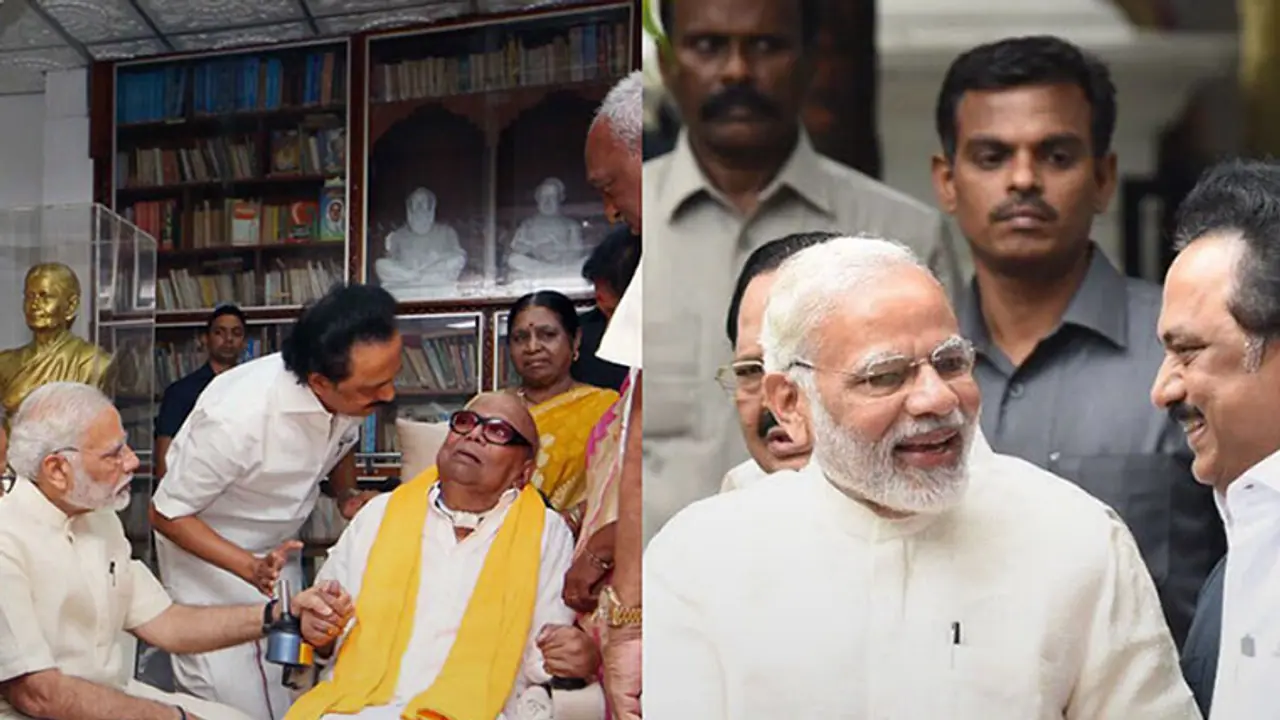Politics is anything but a gentleman's game which is why politicians take great pains to emphasise on "courtesy visits''. But since most netas think four steps ahead on the chessboard, the 'courtesy visit' is usually an innocuous and carefully disguised first move, designed to make an impact a little later in the game and take the opponent by surprise.

Prime Minister Narendra Modi's visit to Gopalpuram in Chennai to call upon the ailing DMK chief M Karunanidhi was that kind of a `courtesy visit'. A fine gesture given that the 93-year-old has been ill for some time and off any kind of political activity. What's more, Modi even reportedly invited the former CM to come to Delhi and take rest at the Prime Minister's official residence at 7, Lok Kalyan Marg.
It elevated Modi's stature from that of a politician, who is at loggerheads with the DMK to a statesman, adept at building bridges cutting across political lines.
It had its effect almost immediately. "It is a gentle gesture and we appreciate it,'' said DMK MP Tiruchi Siva. It is more than likely that the DMK cadre would also be considerably softened by the PM's move to take out 20 minutes for Karunanidhi because the old-timers in particular feel rather emotional about the DMK patriarch's current health status. While its opposition to the BJP would stay, the animosity towards Modi would have got reduced to an extent and in fact, endeared him to the DMK cadre.
The timing of the visit is what made it extremely interesting. It came a day before the Special CBI court announces the date for the 2G case verdict.
Karunanidhi's daughter Kanimozhi is one of the accused and if the verdict goes against her, it would affect the DMK's first family. But if she is acquitted, it would significantly help Karunanidhi and family wash away the corruption taint that has cast a shadow on its political prospects since the scam broke.
Modi knows that MK Stalin cannot afford a hat-trick of electoral defeats under his watch, having failed to lead the DMK to victory in 2014 and 2016. Likewise, the DMK also knows the BJP is desperate to pick up seats in Tamil Nadu to offset possible loss of seats in the cowbelt where it peaked in 2014. The scenario lends itself to the possibility of a political MoU. But since Stalin would be extremely wary of the impact it will have on the minority vote in Tamil Nadu, a jugalbandi can take place only post 2019 polls, depending on the Lok Sabha arithmetic.
In the past few months, Stalin has been critical of the manner in which the BJP is seen to be remote controlling the AIADMK and the Tamil Nadu government. Even the BJP leaders privately admit that their Tamil Nadu strategy has not quite gone according to plan.
The party made the mistake of putting all its eggs in the O Panneerselvam basket, a strategy that did not quite work. The merger was then forcibly thrust on the two factions but the working has been far from smooth, with the two camps still keeping an independent line with the BJP leadership in Delhi.
In such a scenario, the DMK could come across as a better bet. The BJP and the DMK have done business together in the AB Vajpayee era and Karunanidhi has always favoured sharing power at the Centre. A lot will depend on how the ruling AIADMK fares in the local bodies polls. Modi's visit in a not-so-subtle manner has put the Palaniswami-Panneerselvam duo on notice.
The Gopalpuram detour on Monday would also mollify Stalin who has complained that the PM did not give him any time despite his Leader of the Opposition position, even while he meets every other AIADMK leader. If the smiles and body language in the photographs are anything to go by, Modi and Stalin seemed to have broken the ice.
Rahul Gandhi had spent time with Stalin's family when he visited Chennai during Karunanidhi's birthday celebration in June, trying to connect with the DMK heir apparent at a personal level.
Modi's visit will inject doubts in the Congress mind if the Stalin will not have second thoughts about the alliance.
Though Stalin till January this year was heading the DMK Youth wing, at 64, he is closer in age to 67-year-old Modi than to 47-year-old Rahul.
Interestingly, Modi used the Chennai visit to visibly take the BJP's Tamil Nadu strategy into his own hands. At the Dina Thanthi event, he met the who's who of Chennai, making it a point to reach out to greet the likes of MDMK's Vaiko and PMK's Ramadoss. The PM knows that he will have to construct a 2014-like rainbow coalition once again to net some seats for the NDA from Tamil Nadu in 2019.
Not that anything on the ground will change immediately. The DMK will be part of the nationwide opposition protest against the Modi government's decision to demonetise on November 8 last year. Almost as if to convey that the PM's visit won't dilute the DMK's anti-BJPism, the Dravidian party released a statement within minutes of the PM's departure asking its cadre to wear a black badge as a sign of protest on Wednesday.
